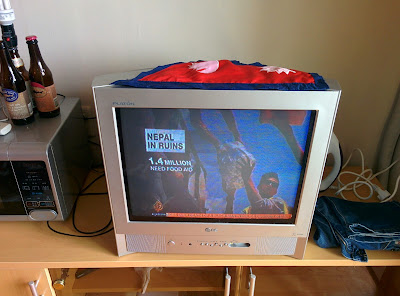Does Mandatory Military Training Now Make Sense?
Sitting here cozily at my cushioned seat behind a brightly lit lenovo screen, life looks deceivingly uneventful. It's quiet, the sun shines brightly without its usual stinginess and everything looks just it should be; calm. But you can't help but think that places around the world are anything but.
Whether it's the war in ukraine, syria, or more recently in yemen, burgundy or in Nigeria where Boko Haram fighters are creating a state of crisis, everywhere you look, every news you read is about people being killed. And where people haven't inflicted pain on themselves, nature has it's own way of saying Bam Bam, Thank You Mam.
It's a harsh reminder of the messy world we live in.
To be honest, no one in Nepal would deny that underneath that external beauty that the country so presumptuously displays, lied a time bomb that was waiting to detonate at the right time; a bomb that was waiting to inflict crisis on a country that was already scraping for daily meals.
Unlike most aid agencies who had declared themselves to help Nepal's most desperate, geologists and seismologists around the world where actually calmer, more composed and even ecstatic in some few cases. The reason? the earthquake was a 7.6-7.9 (depends on whom you trust)...because what they say was Nepal could have been faced with an even bigger crisis had the earlier predictions of 9 come true.
The whole crisis back home would have been even worse had the earthquake nonchalantly decided to shake the ground for a minute when everyone was busy cuddling around their loved ones and sleeping. Add to the fact that it came on a saturday morning when 1. people weren't as spread around 2. when everyone just had lunch and was lazying around meant that they could ensure everyone was OK and well at the same time. Had it been any other day than a saturday and any other time than before noon, the consequences would have been much dire.
So the question most people have been wanting to ask after a quake of this scale has been, quite understandably, what now?
First things first. The aid needs to reach where it should, people should have access to temporary shelter and be able to scrap through without major difficulties. This is well understood, easier-said-than-done things that aid agencies, volunteers and government organizations have been trying to do.
But what strikes me as someone who has been going through this crisis as an observer and not a direct participant is the way we have been preparing for the earthquake. What we have been taught throughout our time in Nepal has been largely focused on what-to-do when an earthquake strikes but nothing about what-should-be-done later on. This has clouded the judgement of people making them confused and inapt in being able to help each other out.
Which leads me to the idea drawn from a place that I currently call my home; Korea. Mandatory military service here is a deeply resented topic to discuss, many trying their best to avoid the harsh two year training they have to undergo to join a ever growing reserve army population. The need for such backup is largely warranted due to their communist neighbor on the north but does this similar strategy work for Nepal as well?
If you remember, this isn't actually a new idea. A team inside the constituent assembly had prepared a concept paper in 2009 where it stated:
“All able citizens who have completed 18 years of age should participate in phase-wise military training and service for two years and those men and women who are not interested due to religious belief and other convictions should perform alternative service”
The idea was to basically create this reserve army where they could be called upon, as the report states, "to protect the national security when the situation arises."
While recruiting Nepali nationals to "protect the national security" wouldn't really work considering how, our immediate neighbors, China and India, can rack up from their unlimited supply of army human inventory, what our army really could do is to train its nationals for search and rescue operations.
Imagine a situation now where each family had a couple of able citizens well trained for such a crisis. If you think the army were the first to respond to the earthquake, these reserve forces, spread literally everywhere, would have been the first once providing relief even before the army had the slightest sense. Then, even people who are residing outside the country would have an excuse to go back home as they might feel capable of contributing to the efforts that has going to uplift the lives of millions back home.
For relief efforts training, a two-year training would be strenuous, however, if it could be limited in between half a year to a year, I would have absolutely no issue on going through the rigors so that I could be of use in future disasters.




5E94524BD0
ReplyDeleteTakipçi Satın Al
Lisans Satın Al
Film Siteleri